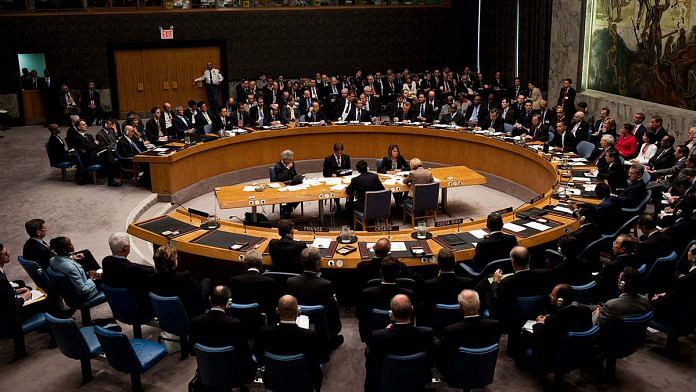New Delhi: Calling for reform of the United Nations to make it “fit for purpose”, India as a part of the G4—with Brazil, Germany and Japan—Tuesday reiterated its stance on expanding the United Nations Security Council (UNSC) to a total of 25 or 26 members, with 11 permanent members.
“The current geopolitical realities warrant a review of this architecture. Reform is essential to make the UN fit for purpose, to enable it to respond meaningfully to the current global challenges… And those who do not endorse real reforms that reflect contemporary realities fall on the wrong side of history, which is detrimental to all of us,” said Parvathaneni Harish, India’s Permanent Representative to the UN in New York, while speaking at the intergovernmental negotiations (IGN) on UNSC reforms.
Harish added: “First, the council membership needs to be increased from 15 to 25 or 26. Second, a reformed Security Council would consist of 11 permanent members and 14 or 15 non-permanent members.”
Currently, UNSC consists of five permanent members—China, France, Russia, the United Kingdom and the United States—and 10 non-permanent members. India is not a member of the UNSC at present.
The third point raised by Harish to the UN was the need to ensure “equitable geographic representation”. The six proposed new permanent members would be two from Africa, two from Asia Pacific, one from Latin America and the Caribbean, and one from Western Europe and others. India falls under the Asia Pacific group.
The addition of these six new permanent members would expand the UNSC membership from 15 to 21 members. For non-permanent members, the G4 nations support the following geographic distribution—one from Asia Pacific, one from Latin America and the Caribbean, one from Eastern Europe, and one or two from Africa—raising the total number of UNSC members to 25 or 26.
“G4 has clarified that any reform not accompanied by expansion of both categories is incomplete in the view of the broad membership. Member states which subscribe to the expansion of only the non-permanent category ignore the existing imbalances in the permanent category fully. Such an approach fails to address non-representation and under-representation in this category,” Harish emphasised.
The inter-governmental negotiations for security council reform first began in 2008, and have continued annually since. However, it gained momentum this year following the 2024 Summit of the Future, hosted by the UN General Assembly (UNGA), which adopted the “Pact for the Future”—a vision document for the future of multilateralism in the world.
As a part of the pact, the UNGA members agreed to reform the UNSC to “address the historical injustice against Africa as a priority”, while also improving the representation from Latin America and the Caribbean, and the Asia Pacific. Prime Minister Narendra Modi had addressed the Summit of the Future in New York in September last year.
Also Read: ‘Signal-gate’ to Laura Loomer’s ire, why US NSA Mike Waltz’s India visit remains in limbo
New Delhi’s push for UNSC reform
New Delhi has long sought a permanent seat on the UNSC, with the power of veto, which is currently held by only the five permanent members. The five countries were given permanent seats at the end of World War II as part of the victorious allies in a UN that consisted of only 51 members.
While ten non-permanent members are also a part of the UNSC, they do not have the power to veto any resolution. China is the only Asian nation with a permanent seat, while the remaining four are from Europe or North America.
The UNSC has increasingly become deadlocked, given that the P5 (permanent five) have rarely found common ground in recent years, especially since the start of the Russia-Ukraine war in February 2022. The UNSC, which is the only body of the UN empowered to pass binding resolutions, has been unable to take decisive action on conflicts in Eastern Europe or West Asia.
In the past, four of the five members have supported India’s push for a permanent seat on the council, with China remaining opposed. Some of the members have floated the idea of granting new permanent seats without veto power.
“A reformed Council with appropriate working methods and accountability mechanisms would be equipped to function effectively and deliver meaningfully on global issues… a consolidated model that does not cover expansion in both the permanent and non-permanent categories would not achieve the purpose of reform, further entrenching the status quo,” said Harish.
While the Pact for the Future outlines ambitious goals, it remains to be seen whether the P5 countries possess the political will to implement the proposed reforms, despite widespread support among UNGA members.
“The Pact for the Future recognises the urgency of this reform process. In this context, we encourage member states and regional groups to submit further models of reforms in order to facilitate text-based negotiations. We invite the Chair to start text-based negotiations now, ideally by the end of the current IGN,” said Harish.
(Edited by Kartikay Chaturvedi, an intern with ThePrint)
Also Read: Jaishankar hints at amending nuclear liability law as India seeks deeper ties with US




